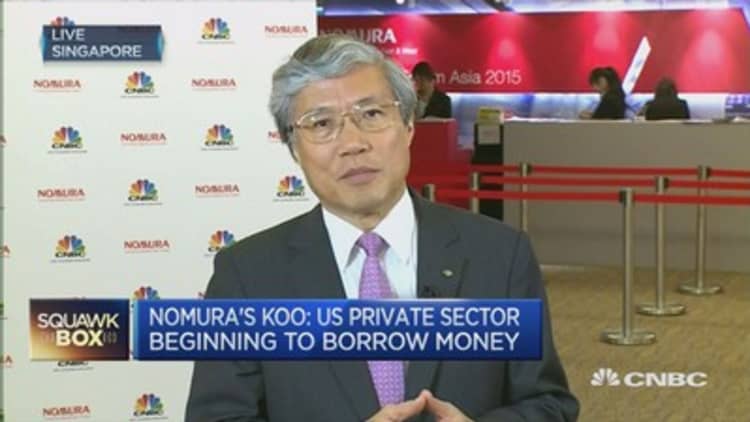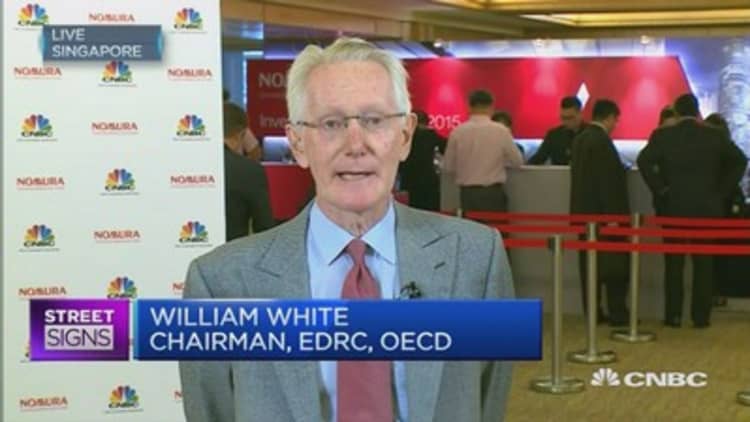
Europe and Japan are in the midst of one and the U.S. phased out theirs last year. Yet for all the money that has been pumped into major economies, the impact of monetary stimulus remains far from clear.
Richard Koo, chief economist at the Nomura Research Institute, told CNBC on Tuesday that he believed quantitative easing (QE) could cause more harm than good.
Koo said that after the financial crisis, the world's private sector had focused on paying down debt, despite the monetary stimulus aimed at encouraging firms to borrow and invest to help kick start economic growth.
"If the private sector as a group in the West is paying down debt there's no way a central bank injection of liquidity will actually enter the real economy because the private sector is not taking the money," Koo said.
He added that only once the private sector finished repairing balance sheets would it start to borrow again.
"But at that time, the QE that didn't do much good at the time of implementation will have to be removed," Koo said. And if the central bank removes QE by selling the bonds it bought as part of that program, this could push up long-term interest rates and hurt an economic recovery, he argued.
All aboard
The U.S. Federal Reserve phased out monetary stimulus last year. In contrast, the European Central Bank launched a 1 trillion euro ($1.09 trillion) QE program earlier this year and the Bank of Japan has pledged to inject 80 trillion yen ($660 billion) a year into the economy through purchases of government bonds and risky assets.
Read MoreSoros: ECB QE means inequality and asset bubbles
Quantitative easing is a contentious policy, often seen as a radical option for central banks when lowering interest rates to around zero percent has failed to have an impact on reviving an economy. The problem, say economists, is that asset-purchase programs can have knock-on negative effects, such as keeping bond yields artificially low or inflating the prices of assets such as stocks.
Read MoreRate hike needed to pop bubbles: Robert Shiller
"It's not impossible that something goes wrong," said David Bloom, global head of foreign exchange strategy at HSBC, told CNBC on Tuesday, talking about QE in Japan.
"When you look at the economy, it's not picking up that much, so will they (the Bank of Japan) do more QE, and will dollar/yen start to rise some more? These are the risks," he added.

Currency impact
The has fallen over 30 percent against the dollar over the past two years – a move that has coincided with hefty monetary stimulus from the Bank of Japan. Earlier on Tuesday, the dollar briefly popped above 125 yen for the first time since late 2002.
Read MoreYen drops sharply, puzzling traders
"The U.S. is now in a position that Japan was in six, seven years ago when Japan didn't do QE and the yen was strong," said Nomura's Koo.
"Now the situation is reversed: Japan has done QE and yen is down 30-40 percent against the dollar and that could depress U.S. economic activity and discourage the Fed from hiking too soon," he said. A stronger dollar makes U.S. exports more expensive in the global market, which could hinder its competitiveness and economic growth.
Data last week showed the U.S. economy contracted at a 0.7 percent annual rate in the first quarter of 2015, compared with an initial estimate of 0.2 percent growth, reinforcing expectations that the Fed is likely to leave interest rates low for longer than anticipated.
"If you take QE as a total from implementation to withdrawal, it could end up hurting the economy rather than benefit it," Koo added.


